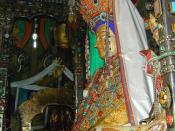Siddhartha is a novel detailing the life and times of a man named Siddhartha. The novel can be read on two levels, a literal interpretation, or a general guideline to "decent" behavior. Throughout the novel, the hero Siddhartha is confronted with obstacles that seem to hinder him on the path toward salvation. However, one of the obstacles that "hindered" him actually turned out to help him. When Siddhartha became a rich man, he lost sense of his goal. However, when he finally came to his senses, he realized that becoming a rich man could give him an experience very valuable toward the knowledge of salvation. This applies to life in several ways. Firstly, one must learn from his/hers mistakes. Siddhartha learned a valuable lesson from being a rich man. Had he not made that mistake, he might not have even reached salvation. An average Joe or Jane could apply this to his/hers life.
Learning from one mistake can expedite the journey to the goal.
When a boomerang is thrown, it more or less comes back. It works the way with good or bad deeds. When the ferryman took Siddhartha across the river he did not expect payment but expected that one day he will be paid back, "...I did not expect any payment or gift from you. You will give it to me some other time." (Hesse 49). Eventually he was. So a good deed done for another, even a stranger, will more or less be paid back eventually in some form or fashion.
This book did not hold too many surprises, primarily due to the mammoth amount of foreshadowing which is very interesting. Practically every major detail in the book is foreshadowed. This sparks an interesting search, not unlike a major treasure hunt. First time readers of the...


